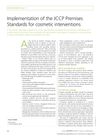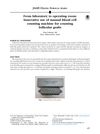 1 citations,
June 2016 in “Aesthetic Surgery Journal”
1 citations,
June 2016 in “Aesthetic Surgery Journal” Body hair is a safe and effective option for hair transplants when scalp hair is limited.
 1 citations,
January 2014 in “Progress in Neurology and Psychiatry”
1 citations,
January 2014 in “Progress in Neurology and Psychiatry” Skin diseases can cause psychological issues, and better integration of dermatology and psychiatry is needed to improve patient care.
 1 citations,
February 2004 in “Dermatologic Surgery”
1 citations,
February 2004 in “Dermatologic Surgery” Deep Plane Fixation in scalp surgeries allows for more tissue removal with less tension, leading to better healing and less scarring.
 1 citations,
May 2001 in “The Cleft Palate Craniofacial Journal”
1 citations,
May 2001 in “The Cleft Palate Craniofacial Journal” The document recommends both books for medical training in aesthetic surgery and wound healing.
 1 citations,
January 2001 in “Dermatologic Surgery”
1 citations,
January 2001 in “Dermatologic Surgery” Pulsed dye laser and hydrogel dressings effectively treat hypertrophic scars.
 November 2024 in “EMJ Dermatology”
November 2024 in “EMJ Dermatology” A new topical treatment using SAMiRNA technology shows promise in increasing hair growth for androgenetic alopecia.
 April 2024 in “Archives of Dermatological Research”
April 2024 in “Archives of Dermatological Research” The approach improves scalp surgery results by tailoring techniques to defect size and location.
 November 2020 in “Journal of Cosmetic Dermatology”
November 2020 in “Journal of Cosmetic Dermatology” The vertical method is better for assessing scalp mobility, providing more hair for transplant.

Topical calcipotriol successfully treated hair loss in three patients with Alopecia Totalis.
 July 2019 in “Journal of Aesthetic Nursing”
July 2019 in “Journal of Aesthetic Nursing” The JCCP's Premises Standards aim to make non-surgical cosmetic treatments safer and higher quality.
 May 2019 in “The Journal of Sexual Medicine”
May 2019 in “The Journal of Sexual Medicine” Drinking alcohol before taking flibanserin does not increase the risk of severe low blood pressure or fainting.
 May 2018 in “Indian Journal of Plastic Surgery”
May 2018 in “Indian Journal of Plastic Surgery” The book is a detailed guide for plastic surgeons with clear explanations and is recommended for both new and experienced practitioners.
 January 2018 in “Journal of The American Academy of Dermatology”
January 2018 in “Journal of The American Academy of Dermatology” A manual blood cell counter was effectively used to count hair follicles during surgery, being user-friendly and cost-effective but limited by a three-digit display.
 January 2018 in “International journal of food and nutrition research”
January 2018 in “International journal of food and nutrition research” Intermittent iron and nutritional supplements can help reduce hair loss.
 December 2017 in “Facial Plastic Surgery”
December 2017 in “Facial Plastic Surgery” The document concludes that successful treatment of upper and midface trauma should focus on restoring both appearance and function, with attention to facial structure, skin, and hair repair.
 August 2014 in “Plastic Surgery”
August 2014 in “Plastic Surgery” Dr. WP Unger suggested that traditional strip harvesting might be better for hair transplants than Follicular Unit Extraction due to higher hair survival rates and less risk of a patchy look at the donor site.
 July 2014 in “Facial Plastic Surgery Clinics of North America”
July 2014 in “Facial Plastic Surgery Clinics of North America” Cosmetic surgery should be personalized for different ethnic groups to ensure the best results and patient satisfaction.
 January 2014 in “Plastic Surgery”
January 2014 in “Plastic Surgery” Follicular Unit Extraction (FUE) for hair transplants has limitations and may not be suitable for most patients.
 June 2013 in “Aesthetic Surgery Journal”
June 2013 in “Aesthetic Surgery Journal” The book is a detailed guide on aesthetic surgery with useful content and visuals, but lacks new techniques and a CD, rated 4 out of 5.
 May 2013 in “Facial Plastic Surgery Clinics of North America”
May 2013 in “Facial Plastic Surgery Clinics of North America”  April 2009 in “Dermatologic Surgery”
April 2009 in “Dermatologic Surgery” The document concludes that the first book on mesotherapy lacks convincing evidence, the second book is good for beginners in facial rejuvenation, and the third book is valuable for understanding complications in skin surgery.
 July 2008 in “Expert Review of Dermatology”
July 2008 in “Expert Review of Dermatology” Proper planning for hair transplants is crucial for natural results, with careful patient selection and strategic graft placement being key factors.
 July 2008 in “Facial Plastic Surgery Clinics of North America”
July 2008 in “Facial Plastic Surgery Clinics of North America” Men's facial rejuvenation involves unique challenges and is increasingly popular, with many opting for nonsurgical treatments.
 May 2004 in “Archives of Facial Plastic Surgery”
May 2004 in “Archives of Facial Plastic Surgery” The book is a detailed guide on facial rejuvenation techniques and is recommended for new facial plastic surgeons.
 February 2004 in “Dermatologic Surgery”
February 2004 in “Dermatologic Surgery” Deep Plane Fixation in scalp surgeries allows for more tissue removal with less tension and minimal scarring.
 August 2003 in “International Journal of Cosmetic Surgery and Aesthetic Dermatology”
August 2003 in “International Journal of Cosmetic Surgery and Aesthetic Dermatology” Disposable instruments could be the future of hair restoration surgery to eliminate disease risk, but they require careful preparation and proper training.
 September 2002 in “Dermatologic Surgery”
September 2002 in “Dermatologic Surgery” The evaluation system improves patient selection for hair loss surgery, leading to fewer but more successful surgeries.
 January 2002 in “Dermatologic Surgery”
January 2002 in “Dermatologic Surgery” Minoxidil is effective in preventing hair loss after facelift surgery.
 January 2001 in “Dermatologic Surgery”
January 2001 in “Dermatologic Surgery” The letters discussed medical tools, costs, treatment efficacy, and patient care complexities.
 May 1999 in “Dermatologic Surgery”
May 1999 in “Dermatologic Surgery” Dr. Zitelli emphasized that "Mohs surgery" should only be called that when one doctor does both the surgery and pathology.






























